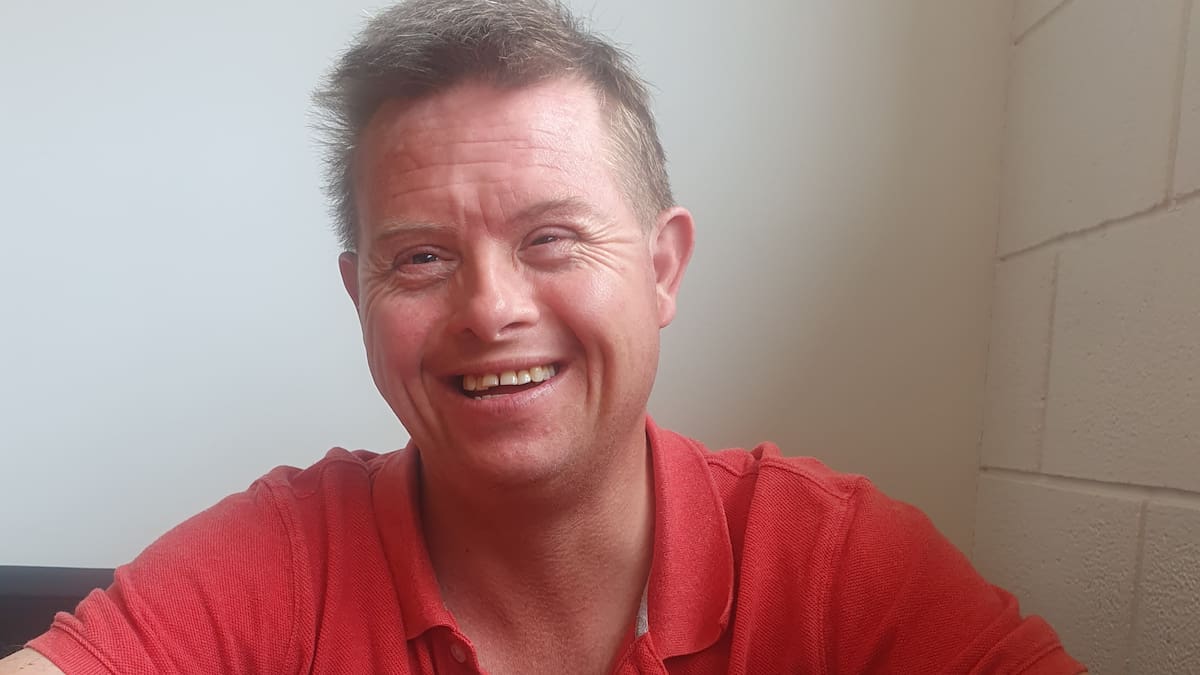Travers Brown, 43, has Down’s syndrome, and his mother, Colleen Brown, says cuts to disability support are causing sadness and confusion for carers.
opinion:
Our son, Travers, is 43 years old. He has Down Syndrome and is a treasured member of our family. We have had to fight for him his whole life for all he has accomplished. We have fought for his right to attend local elementary and middle schools, for his right to additional physical therapy, for his right to higher education, and for his apartment. We have had to explain over and over again why he needs special support. We are survivors of an education and political system that is sometimes indifferent. We are incredibly proud of Travers and the life he is living now. He lives with his buddies in an apartment near his brothers and sister, a short drive from us in our pajamas. I say a short drive from us in our pajamas only because he is an adult, we are still watching and ready to take action to support him whenever he needs us, no matter what.
Being a disabled parent is never secure because for every thing we get, we pay a price. We are expected to be grateful. Thank you for every drop of support, thank you for every medical intervention, thank you to the principal who enrolled my son, thank you to the politicians who understand my needs. The word “gratitude” pisses me off. It comes from a charity model where the poor get charity from the betters. It sounds like others are dictating to you how to live with the little support given to you. Crumbs under the table. My beautiful son is not seen as “contributing” to this society. He is not seen as an economic unit, which means he doesn’t really matter.
 Colleen Brown, whose son Travers, 43, has Down’s syndrome, said the cuts to support for carers had left her sad and confused.
Colleen Brown, whose son Travers, 43, has Down’s syndrome, said the cuts to support for carers had left her sad and confused.
This truth was thrust upon us with a bang on Monday 18th March, ironically the same week as World Down Syndrome Day. The Ministry for Disability (Waikaha), for which the disability community has fought so hard, announced on their Facebook page that they were changing how disability funding is being used. I have never seen such widespread sadness and confusion over an announcement from the Ministry. Without any consultation, people’s lives and ways of surviving have been turned upside down. There is widespread confusion, trauma and disbelief in the disability community that something like this could happen. Yet it is happening. No matter how you interpret it, funding appears to have been “paused”.
Advertisement Advertise on NZME.
Minister Penny Simmons says the caregivers are getting massages. Minister, I wanted a massage when I was pregnant with my third child and had to carry Traverse everywhere. He didn’t walk until he was almost three years old. I commend the caregivers for having the insight to look after themselves. Apparently our children are comfortable going to strange places for respite care instead of asking a trusted family member to stay with them while we sleep overnight away from home. This is not about having a fun night, I’m telling you. This is about survival. Caring for the disabled requires a high level of trust. Minister, the highest trust I could give to anyone is caring for my son.
The question on every parent’s lips is, “If I die, what will happen to my disabled child?” It’s an uncomfortable thought, but it’s the reality.
We are in this situation now because successive governments have not invested in the disability sector. Yes, money has been put into schools, supports and equipment, but not into the tricky areas of respite care and housing for disabled people and their families. Unfortunately, disabled people outlive the trauma of birth and outlive all the budgets that surround them.
But it gets worse. This latest revelation comes on top of incremental changes to the way benefits are calculated, an overhaul of school meals, cuts to public transport subsidies and the reintroduction of prescription drug charges. Note to ministers: not all prescription drugs are covered by the Community Services Card and not all families with disabled children have one. We feel targeted.
Advertisement Advertise on NZME.
We in the disability sector have been down this road before. Through successive administrations, we have faced this situation time and time again. Sadly, very sadly, I have written before about the loss of life when people feel hopeless and see no future for themselves or their disabled family members. And then we lose people. That is the reality we face. Now is the time to reach out to those you know in the disability community and show them that you care, show them that you care, show them kindness, offer them hope.
Colleen Brown is a disability spokesperson for the Child Poverty Action Group and chair of Disability Connect.
Source link

